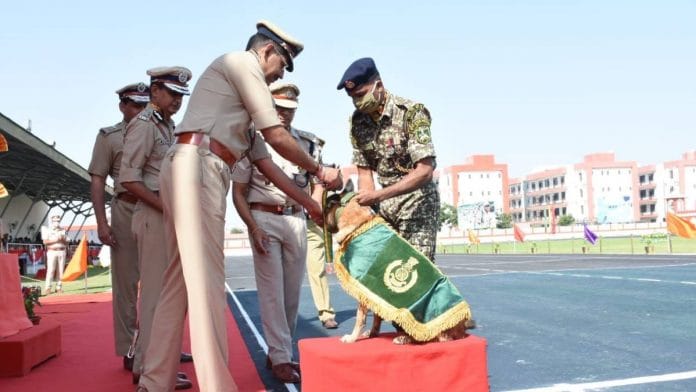New Delhi: The Indo Tibetan Border Police (ITBP) has awarded a special medal for ‘best dog’ to Snowy — an eight-year-old female Belgian Malinois — for detecting an IED packed with over 50 kg explosives during a patrol in Chhattisgarh’s Bakar Katta area on 27 September, and saving the life of 25 troopers.
The IED detected by Snowy then led the bomb squad to detect five more IEDs, each packed with over 50 kg of explosives.
A horse named Champion, who served the force along the Line of Actual Control (LAC) was also given a medal for best horse by the ITBP.
ITBP Director General Sanjay Arora awarded the special medals to Snowy and Champion at the annual DG’s parade Saturday. ITBP started awarding their ‘best dogs’ and ‘best horses’ from 2016.
“Dogs play a crucial role in detecting explosives and ambushes and keeping troopers safe. Snowy specialises in explosive detection during patrols and that is how she was able to sense an ambush and the explosives and could save so many lives,” a source in ITBP told ThePrint.
Dogs working with the ITBP have a service life of eight years, after which they are kept at the National Training Center for Dogs in Panchkula. For horses, the retirement age is 16 years.
Also read: 20 ITBP troops awarded gallantry medals for bravely fighting Chinese PLA in Ladakh last year
‘Her ears cocked, she sensed the explosives, did not budge’
Speaking to ThePrint, Dr Sudhakar Natarajan, DIG (Vet) ITBP said that Snowy is not just an alert dog, but “extremely dedicated”.
“She saved 25 lives on 27 September, while she was on an area domination patrol with the 40th Battalion at Bakar Kata area,” Natrajan said.
“A lone Naxal was waiting to strike at the ITBP patrol party on a hillock. According to intelligence input, we found that around 1,500 fully armed Naxal cadres were behind teak trees, waiting to launch an attack. But Snowy sensed the ambush and the explosives,” said Natrajan.
Recalling the dog’s behaviour, he added: “Her ears cocked and she stopped”.
According to Natrajan, Snowy’s handler, walking 20 feet behind her, also stopped when she did. He then lifted his right arm in the form of a fist— a signal to the party commander and the troops took tactical positions.
“They knew that if Snowy had signaled, then there was something wrong,” said Natrajan.
The ITBP handler then ordered Snowy to move on.
“But no, she would not budge. Snowy stood like a wall between the IED and her troops. She was doing what she had been trained to do — protect her troops,” said Natrajan, with pride in his voice.
“It was clear that Snowy had detected a danger of ambush and got the air scent of explosive devices, since the party was down wind (the wind was blowing in the direction of the troopers),” he added.
It was later confirmed that around 1,500 Naxals had moved out of the jungles and had mingled with the local villagers.
Also read: Lt Gen Hooda bats for ITBP to be under Army, says step necessary at ‘unsettled’ borders
‘Spotted the explosive within 15 seconds’
After the troopers retreated realising that something was wrong, Snowy was deployed to sanitise the area and within 15 seconds she detected one pressure cooker bomb, packed with over 50 kg of explosives, said Natrajan.
“She came running back to her handler (and took him to the spot where the IED was planted) and the ITBP commander called for the bomb disposal squad,” he said.
“Following that wire of the one pressure cooker bomb that Snowy spotted, the bomb disposal squad found a series of five more bombs. It was a series of six bombs, with 50 Kgs each of lethal explosives, which means over 300 kg of explosives (in total). The explosives would have been enough to kill 15 and wound another 15 men in a killing zone of 100 meters. Packed with ball bearings, nails and iron filings,” he said. “That day Snowy saved the day,” he added.
(Edited by Poulomi Banerjee)
Also read: Neither MoD nor MHA can resolve the unacceptable state of affairs on Indo-Tibetan Border






